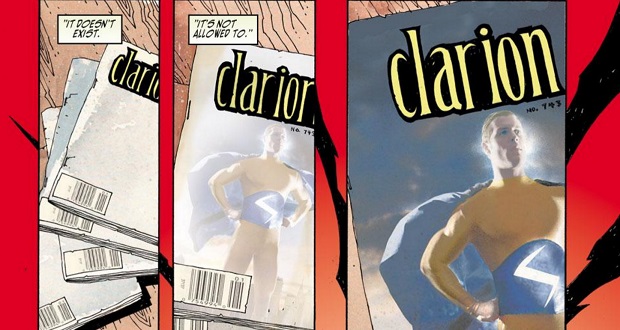Modern Marvel Part 1: The Sentry
The Sentry, 2000
A journey through Modern Marvel, beginning in the period leading up to the Avengers Disassembled event and continuing until the heat death of the universe. Given the nature of comic books, the universe(s) may suffer multiple heat deaths. We'll go right up until the last one.
It might make sense to begin my exposure to Marvel Comics with an origin story of some sort. Maybe find out how one of the big-hitters first donned the spandex or how The Avengers came together. Those are the stories that I've picked up through cultural osmosis though - I might not know what names the X-Men go by when they're not using their oh-so-descriptive callsigns, but I have a good idea about who most of the main players are and what they can do. I know about Uncle Ben. I'm aware of the Weapon X program.
Where to start then? The Sentry, a 2000 miniseries by Paul Jenkins (words) and Jae Lee (art) is as good a place as any. It is both the most continuity-heavy comic I could possibly have picked and also the one in which continuity matters the least.
I had no idea The Sentry existed, which is appropriate given the events of Jenkins' story. Created for this miniseries, he is both the Silver Age ideal of a superhero, seeded through the fictional history of the Marvel universe and the long-forgotten alter ego of a broken-down middle aged man. Along with the spin-off one-shots that follow (Fantastic Four, Spider-Man, Angel, Hulk) and concluding issue The Void, the five issues that make up the mini-series form that rarest of things - a self-contained superhero story that touches on and causes ripples in the fabric of the wider Marvel universe, but does not require knowledge of that universe.
In its depiction of a man who no longer understands his place in the world, this is a deeply melancholy story. I'm surprised I hadn't heard of it before now because it seems natural to mention it alongside Grant Morrison's much-discussed Animal Man run in the late eighties. While not as blatantly metafictional in its approach to superheroics and the convoluted plotlines of the big publishers, Jenkins' work finds a similar desperation and sadness in the life of its titular character, whose most significant ability is the power to be forgotten and erased.
The art, across the oneshots in particular, is wonderful, particularly in its blend of the old and the new. As the Marvel universe begins to eat itself, incapable of accommodating the very idea of someone so significant and yet so new, flashes of Silver Age innocence shimmer through the darkness. Even though the eventual conclusion leans far too heavily on a bossfight, of sorts, and the exploration of alteregos takes too-predictable a turn, The Sentry is a magnificent piece of work.
It's an examination of the difficulty involved in writing characters within an inconsistent but highly regarded continuity, and of the impossibility of change in a fictional universe that hits the reset button whenever things become too messy. There's an exploration of the dynamics of a power in a world packed with godlike figures; how can all of these characters be necessary at the same time? And would the existence of something more powerful still eventually erase the lesser heroes from memory?
As an entry point, The Sentry is perfect. It introduces plenty of heroes - with Reed Richards (Mr. Fantastic) carrying the bulk of the character development on his stretchy shoulders - and gives a good impression of where they stand in relation to one another. I've never seen the Hulk quite like he is in this story and I'd love to see more of this conflicted creature. Most of the actual Hulk comics I've read, if not all, come from his earliest appearances. I've read the original, short run of his self-titled comic and most of the Tales To Astonish books that he appeared in during the late sixties.
When I hear people talking about World War Hulk and Planet Hulk, I'm completely in the dark. I've always assumed World War Hulk pits a bunch of Hulks against one another and I guess they might be on Planet Hulk at the time? Planet Hulk, in my imagination, looks a lot like Dredd's Cursed Earth except every mutant is a Hulk (I haven't googled to correct myself or asked anybody to explain what the titles refer to because I want to be surprised).
I'd always thought there was just the one Hulk, until recently, but then I learned about She Hulk (a lawyer!) and Red Hulk. It's entirely possible that Red Hulk is just the regular Hulk with sunburn. I don't know. I always liked the "We have a Hulk" line in The Avengers - there's nothing to suggest that Stark knows about other Hulks but he doesn't go with the definite article there. It's a Hulk. What does that mean?
Anyway, The Sentry does good Hulk.
I found it to be a great entry point because it's not at all what I expect when I pick up a superhero comic and yet it's grounded in some of the constants of the Marvel setting. It's also a splendid story in and of itself, even if the storm doesn't quite live up to the calm.
Next week, I meet Daredevil and Elektra. All comics featured are available on Marvel Unlimited at the time of writing.




